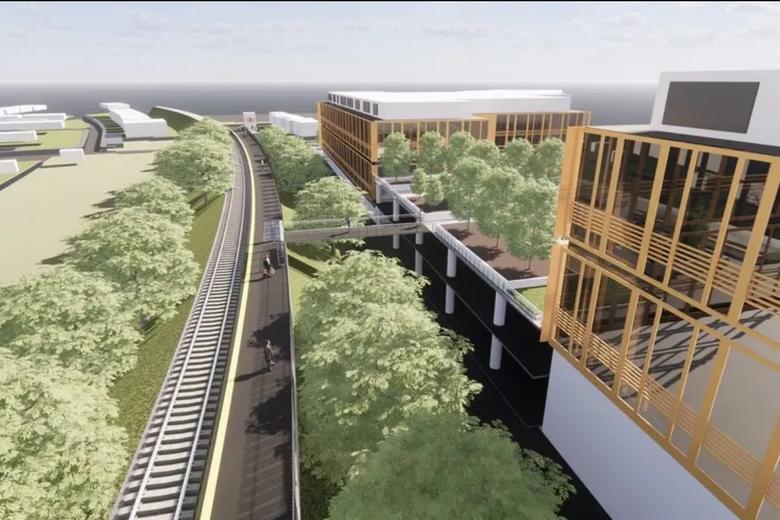‘A COLOSSAL LABOUR OF LOVE’
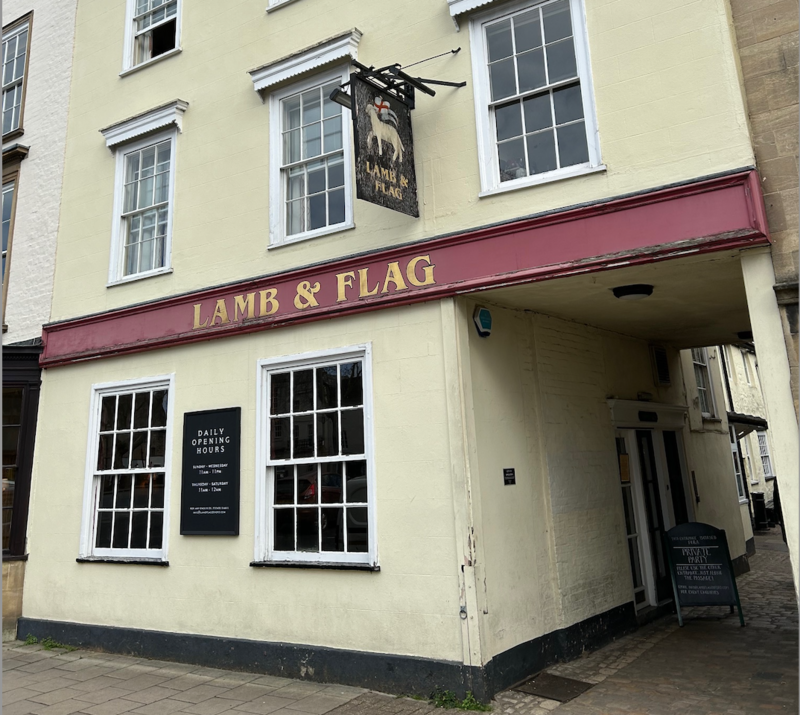
‘A COLOSSAL LABOUR OF LOVE’
We talk to Dave Norwood and Anoushka Rowland-Payne about the re-opening of the Lamb & Flag pub on St Giles.
Published: 12 March 2024
Author: Richard Lofthouse
Share this article
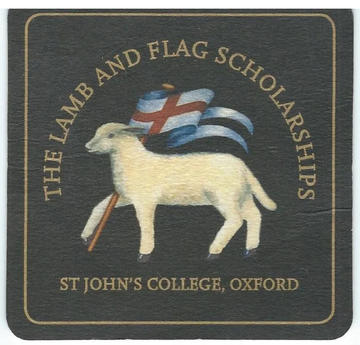
Many were devastated when Oxford’s world-famous Lamb & Flag, owned by St John’s and run as a Public House since the 1570s, failed to re-open in January 2021, following successive COVID-19 shut-downs.
The realisation that it had ‘failed to re-open’ wasn’t quite the same as suddenly closing its doors, however.
It wasn’t a well-publicised shock at the time, simply because the closure was set against a broader context in which we had all grown accustomed to silent streets and shuttered windows. Equally silent and shuttered across the road, lay the Eagle and Child, for example, while large swathes of Oxford’s other retail estate closed too, whether on Broad Street or Cornmarket. The closure was in that sense 'normal' for the time.
But that wasn’t how the news was greeted by Oxford legend, Keble alumnus, chess prodigy and Oxford enterprise venture capitalist supremo Dave Norwood (Keble, 1988), the man who got Chinese conglomerate Tencent and Google to invest hundreds of millions into Oxford start-ups.
More than anyone else we can think of, it is Norwood who has propped up the brilliant Oxford tradition of conversation across a pint between colleagues. It is exactly what J.R.R. Tolkien (Exeter, 1911) and his circle swore by as a way to progress ideas, although the ideas often trumped the drinking, to the point where the Eagle and Child landlady kicked them out for not spending enough. Across the road they came to the Lamb & Flag – the reason why both pubs can lay claim to the patronage of The Inklings.
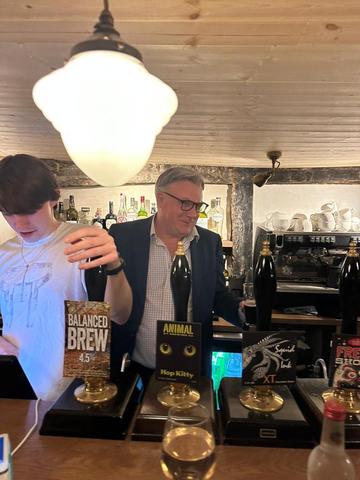
Norwood remembers in detail the first pint he ever had in Oxford, in his first term in October 1988, and it was at the Lamb & Flag. That detail embellishes a close link to Keble - when the pub re-opened Ed Balls (Keble, 1985) the former Chancellor of the Exchequer attended. Norwood recounts, 'He went behind the bar and shouted, 'Drinks are on the House!' (Pictured, right)
Returning to 2021, Norwood says, ‘Initially I just wanted to get it re-opened as soon as possible. We needed half a million quid. I know quite a few people who could do that on their own. I began to speak to some of them. But I then came to realise that this was totally wrong. There was such an abundance of love for the pub. It came pouring out from all directions, like an avalanche. So we scrapped the rich-man model and created a Community Interest Company (CIC) with 300 backers – 'Inklings' –that ranged right across the Oxford community, alumni, professors, students, locals with no University connection.’
The minimum investment was £1,000 and the maximum was £10,000. Quickly, Norwood had the money needed to go about re-opening the pub as soon as possible, except that it didn’t go quite like that.
‘Once you have a load of Oxford people you have fierce disagreements about literally everything,’ laughs Norwood.
‘We all agreed, however, that the loos ponged and needed to be re-done, so I hired builders and they started work.’
That turned out to be the tip of a vast iceberg of issues than started to threaten the original vision, apparently so simple: re-open a pub.
‘The trouble is that the building is Grade II listed, so you can’t do stuff to it without permissions.’ Norwood ran headlong into the bureaucracy and suddenly found that his scheme was in trouble.

This is where Anoushka Rowland-Payne (Christ Church, 2016) comes into the story. Anoushka, who as an undergraduate won the fabulously prestigious Gladstone Prize for history (double star for being at Victorian Prime Minister Gladstone's former college when she did it), was introduced to Dave by a mutual friend (pictured left, together playing chess).
Anoushka specialises in historic building design and drafting the associated planning permissions, and was ready for the challenge.
What ensued was a full restoration of the pub, with fanatical attention to architectural details that respect the gloriously multi-era palimpsest that defines any ancient British pub.
For example, Anoushka explains how the quarter-sawn oak effect of the panelling in the front ‘Flag Room’ is actually painted, sustaining a long tradition of faking expensive hardwoods in pubs. If you look at it you can’t tell.
‘The ceiling was papered in Anaglypta and tinted with a tobacco glaze in reference to the ubiquitous yellow-brown staining pre-indoor smoking ban…’
Dave jokes that he was terrified by someone with a name like Anoushka. Anoushka, who runs a historic buildings design consultancy, meanwhile might have worried about jumping into a loo modernisation project mired in paperwork.
Elsewhere the historical cues are much older, delving back down the centuries, and as you go back into the pub there is the bar and a kitchen.
Food turned out to be a fierce debate among the new generation of Inkling investor stakeholders.
Dave says, ‘There was one lobby that was wedded to having really good food, the gastro-pub model. But I had never wanted a meal in the Lamb & Flag, not once. In the end the matter resolved itself in the sense that the kitchens are tiny and could not be revised to cope with fine food preparation.’
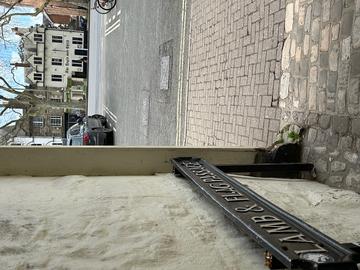
The resolution of the food turned out to be home-made sausage rolls and Oxford (brown) sauce made by Alice Dudbridge-Hay, landlady with landlord Dylan Dudbridge-Hay, the duo who currently run the pub.
‘There’s a snack menu but not any old snack menu – keep it simple, but retain a character that you can’t get elsewhere,' says Norwood.
The entire restoration rolled along through 2021 and over into 2022, and working with the City Council the retrospective application for listed building consent rubbed along in the background.
Norwood recounts, ‘In the end it became a major worry. We did not have the consent. I had dozens of Inklings shouting at me ‘when is the pub going to open?’ By then we had already had all the pre-opening parties.’
The receipt of the buildings consent is a story in itself.
Anoushka explains how there is small alcove, known today as the table-for-one which occupies the old stairway access to the cellar, another great detail lovingly re-cast and worth seeking out the next time you visit.
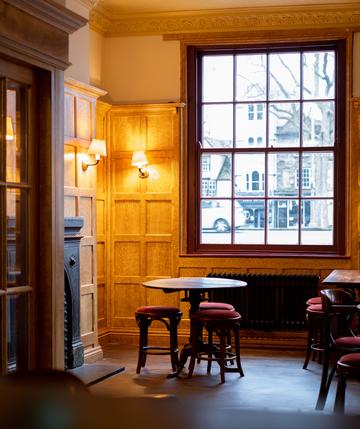
After weeks of worried waiting as the clock ticker ever louder, Dave says he finally came into the pub, bought himself a pint and sat down on the magic seat at the table-for-one, and ‘literally as I opened my phone, at that very second, I got a note from Anoushka that said the buildings consent had been granted retrospectively.’
He continues, ‘You might think I’m embellishing this to try and make a story of it. But I’m not. It is literally what happened.’
The benefit of staging the conversation about the re-opening of the Lamb & Flag in March 2024, is that it can already be seen to have worked.
Dave’s vision was that the pub should now be open for a thousand years, and none less hallowed in reputation and history than the university that surrounds it.
Across the road, a similar re-construction is about to begin under the eye of none other than Lord Foster, under recent new ownership by the Ellison Institute – a sure sign that the sorry closures of the post-Covid era are now being replaced by a new phase of recognition.
It’s not just that the pubs are famous because of the association with the historic Inklings, but that the association also represents a working and proven model of knowledge exchange centred on direct face-to-face conversation, over a pint (doesn’t have to be alcoholic), - the more relaxed counterpart to lab and library.
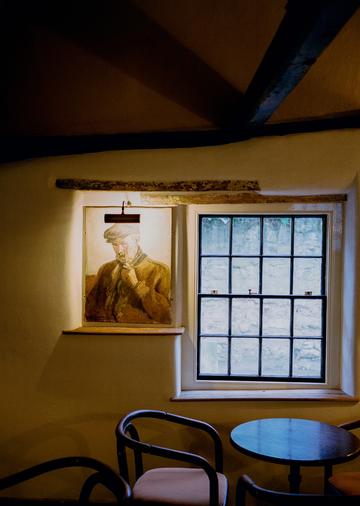
Weirdly, in our era of mental health concerns, the old pub model might turn out to be as avant-garde as it gets, the super-modern renewal of a tradition that is broadly being realised within the more formal settings of the University, where innovative seating and settings and a more permissive attitude to bringing hot drinks to your desk, are all part of a more supportive renewal of the University offering to the student body.
Do the Inklings get special discounts? Apparently they get nothing other than knowing they helped to do something wonderful. ‘We didn’t want a club-atmosphere or anything exclusive like that,’ says Norwood.
In fact the ongoing governance is a major commitment. There is a board and it has to balance all the stakeholders. The cheapest pint has to be accessible to undergraduates but the pub only serves local beers; meanwhile the pub renders rent to St John’s and any profits support St John’s College student scholarships.
So far so good: the pub washes its face as the saying goes, but Dave notes that profit margins are wafer thin, that sitting outside a major brewery or chain-ownership model means there are no particular economies of scale, and that inflation has made it a terrible time to operate a pub.
But when it opened on 6 October, 2022 some of the stalwart members of the Campaign for Real Ale (CAMRA) attended and recorded their notes on the night. They all praised the beers on offer, an emerging favourite the ‘wonderfully hoppy’ ‘Rude Not To’ by Cholsey-based Amwell Springs. Another noted the ‘generally lighter and slightly more contemporary feel,’ (high praise we think) while another said rather terrifically, simply that the restoration amounted to a ‘colossal labour of love.’
But our favourite note – the one we’d have Larry Ellison and Norman Foster pay heed to across the road – was that ‘However you individually fit in or don’t, it’s still a real pub.’
Lamb and Flag, 12 St Giles', Oxford OX1 3JS.
01865 515787.













